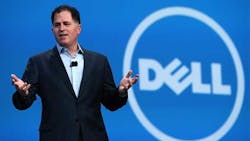Michael Dell Talks About the Benefits of Running a Private Company
The man who, to date, led the privatization of one of the largest companies, by revenue, has something to say about how finance influences business decisions. Michael Dell, CEO, took his namesake Round Rock, Tex.-based company private in October 2013, the year it ranked 24 in the IW US 500 with nearly $57 billion in revenue.
Dell shared his opinion in the July/August edition of Inc.
"People see that there is a problem of too much short-term thinking in financial markets; it's a real affliction. That we were able to extract ourselves from that and think much more about the medium and long term, that's an idea people get excited about."
- "We can be on offense all the time as a private company. We're investing aggressively in knowledge and talent and resources... If you are running a public company, you've got to deliver short-term results. You need to deliver this amount of earnings the quarter, so your investment approach is going to be modified."
- "On top of that, there's always the threat of shareholder activism. People saying, 'Oh, you have too much cash on your balance sheet; why don't you give us a dividend? Why don't you do a share repurchase? Why don't you spin off that division or split the company up?' That's a very different approach than I can take as the founder-owner-operator, the ultimate long-term investor."
- "...We can move more quickly as a private company." Describing the departure of a CFO, Dell writes, "If an officer is going to leave, that's a big deal for a public company. Had we been public, we would have had to plan the timing of the announcement, think about all the questions that might arise, and get all these opinions from different people. We might have waited 90 days to make the decision official. That kind of thing happens all the time, and it's total nonsense. As a private company, though, we knew exactly what to do. We had a successor ready to go, and we announced it almost instantly."
Indeed, being free from shareholder demands is part of what made possible the $25 billion deal to take Dell private, noted a November 18, Forbes article:
"The growth-challenged company will be buried under just less than $20 billion in debt in an industry in secular decline.
"But [Carl] Icahn, [former shareholder and critic of the deal], knows what Dell does: that without dividends and buybacks, he should have enough cash flow to cover the interest payments. And without the public markets to worry about he has the flexibility to pull off the rebalancing act."
Being a private company also will allow Dell to leverage the company's PC business in a way that would be impossible for a public company. Forbes explained:
"Most critically, the world’s third-largest personal computer maker has no plans to abandon the PC, despite that product line’s sinking fortunes. In fact, he plans to sell way more of them and, if the recent past is any guide, he may just sell them at a loss. Selling commodity boxes on the cheap allows him to get Dell in the door to upsell customers on lucrative software and services. Dell has driven down the prices of PCs many times before. But a PC maker selling PCs as a loss leader? That’s the kind of thing you get to do when you take a company private. 'We’ve always viewed [PCs] as a business that’s got a life cycle to it. Growth is in new areas, and it’s a business you’ve got to manage very efficiently from a cost structure. It’s still a great way to get into new customers,' says Dell."
Michael Dell Keynote: On Leading a Private Company
About the Author
Patricia Panchak
Patricia Panchak, Former Editor-in-Chief
Focus: Competitiveness & Public Policy
Call: 216-931-9252
Follow on Twitter: @PPanchakIW
In her commentary and reporting for IndustryWeek, Editor-in-Chief Patricia Panchak covers world-class manufacturing industry strategies, best practices and public policy issues that affect manufacturers’ competitiveness. She delivers news and analysis—and reports the trends--in tax, trade and labor policy; federal, state and local government agencies and programs; and judicial, executive and legislative actions. As well, she shares case studies about how manufacturing executives can capitalize on the latest best practices to cut costs, boost productivity and increase profits.
As editor, she directs the strategic development of all IW editorial products, including the magazine, IndustryWeek.com, research and information products, and executive conferences.
An award-winning editor, Panchak received the 2004 Jesse H. Neal Business Journalism Award for Signed Commentary and helped her staff earn the 2004 Neal Award for Subject-Related Series. She also has earned the American Business Media’s Midwest Award for Editorial Courage and Integrity.
Patricia holds bachelor’s degrees in Journalism and English from Bowling Green State University and a master’s degree in Journalism from Ohio University’s E.W. Scripps School of Journalism. She lives in Cleveland Hts., Ohio, with her family.
